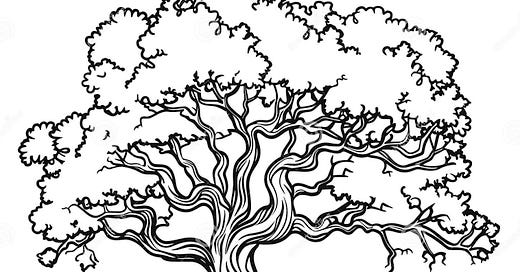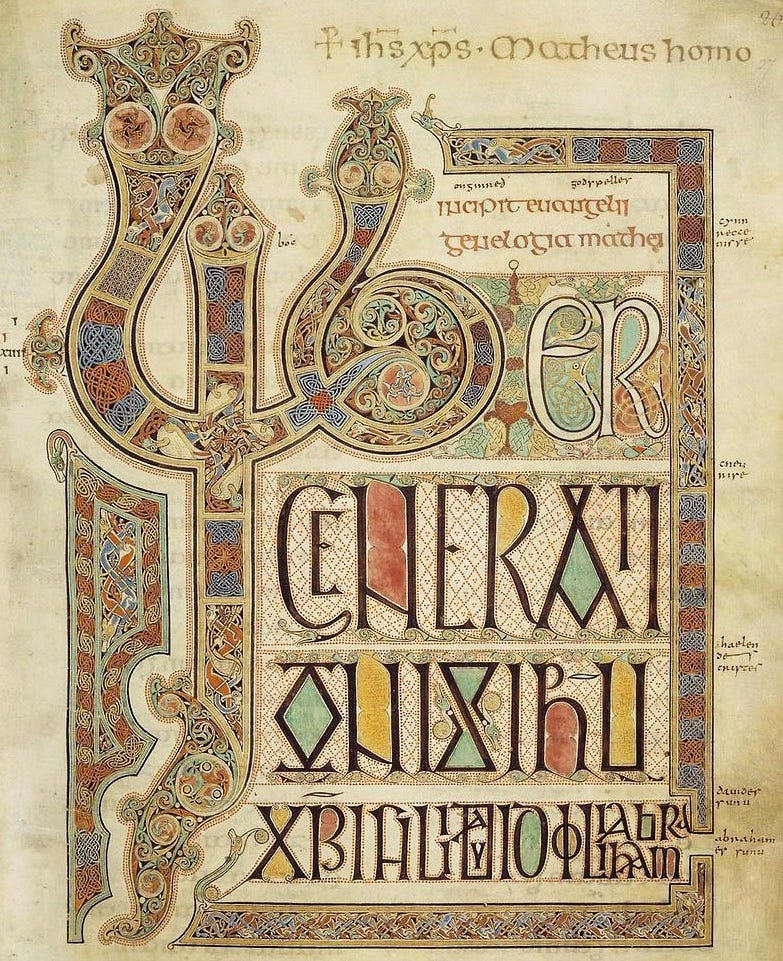A reader recently asked me about how I choose what I'm going to write about. I shared that I "farm" a list of new ideas and keep a few dozen in various states of readiness. My mission with Semper Doctrina is to explore ideas related to leadership, strategy, and innovation - - for both individuals and organizations: My ideas are on these themes and other, related ideas I want to flesh out further. What I am taking in from the world, interactions I have with others, and how I am feeling during the week before a post, determine what I harvest from that list and offer up. This week: How might various situations call for very different people, roles, and behaviors? This is a key leadership issue. Let's talk about Vikings vs. "farmers".
Conjure up images of two, very different peoples. Did you know the Viking "raider" actually did want to farm? He looked with envy at the higher-quality farm land to his West - - this was a key driver of Viking raiding, kicked off in the late 8th Century with attacks like the one at Lindisfarne (Holy Island), off the coast of North East England.
The Anglo Saxon farmer of this time would have grown seed crops, like wheat, barley, and oats. Vegetables like turnips, onions, carrots, and peas, were also grown. Farm animals - - sheep, goats, cows, chickens, ducks, and geese - - gave meat, milk, wool for weaving, feathers for bedding, and leather. Most farmers were poor and rented their land from its owner, their lord. Skilled tradesmen, like blacksmiths, would have bartered their skills and goods for the farmer's food.
Seasons controlled everything, most importantly when food was planted and when it was harvested. Crops were rotated: In the three-field method, a Spring crop in one, an Autumn crop in another, and the third left fallow so its soil can recover. Animals were kept inside owners' homes for safety and warmth at night, and homes were clustered together, within a compound's palisade, under the lord's protection.
Vikings also farmed, but on a far smaller scale; they grew similar crops, kept similar animals, and lived in similar dwellings. Vikings left family land to the eldest son, creating a powerful incentive for the other sons to leave and to raid, in an attempt to acquire wealth and / or farmland. Their men gone raiding, women managed affairs in their absence.
THESE TWO SOCIETIES, TWO WAYS OF LIVING, PRIZED VERY DIFFERENT QUALITIES
Viking men and women were much more independent than their Anglo Saxon neighbors. I wrote of their innovative prowess in a previous post, "Love Your Flokis". Daring and courage were highly prized; Fireside tales were of the thunder-god Thor, the raven-flanked god Odin, the goddess Freyja, and numerous other deities. Men learned teamwork and formed strong bonds, honed in rough sea passages; this fostered unit cohesion and boosted the morale of raiding parties. Social mobility was high: A successful raid meant more wealth and backing for more lucrative raids. Battlefield promotion was the norm; a great fighter or leader could quickly rise up in rank, solely on displayed merit.
Anglo Saxons had more stable and complex social structures. While the Vikings left us few surviving works of art or literature, Anglo Saxons produced remarkable art, written works, and architecture, much of which survives today - - like the Lindisfarne Gospels, above, from around 700AD. Recent converts to Christianity, Anglo Saxons emphasized piety and had both the Church and the State - - king, nobles, lords - - as stabilizing forces. Social mobility was fairly low: Advancement was very incremental and slow, with few, big opportunities to display individual talent and initiative. Younger, landless men would have been drawn to the Church, not raiding! Talented individuals worked to excel, and advance, in increasingly complex systems and organizations.
While the Vikings did, and still do, give us exciting tales of conquest, the Anglo Saxons gave us a big chunk of Western Civilization.
Can you see examples these two societies around you today? What organizations do you see behaving more like one or another? How about your organization? Tell us in the comments.
ARE YOU BORN VIKING OR FARMER?
To answer this question, let's take a look at a couple of qualities, or traits. Some people are what we call "novelty seeking", a behavioral trait where you thrive in chaos, are easily bored, and might be a bit, let's say, temperamental. This trait has long been - - negatively - - associated with a host of problems, like attention deficit disorder, compulsive spending and gambling, alcoholism, drug abuse, and criminal behavior. A better understanding of the trait, however, tells us that novelty seekers are very adaptable to change, are adventurous, and have natural curiosity.
While the science has not (yet) conclusively proven it, it is widely believed to be linked to variations in the dopamine D4 receptor gene (DRD4). This effect also varies across populations.
Does this sound "Viking" to you? It does to me. In most cultures of the time, curiosity was considered a vice, and people were accustomed to very little change in their day-to-day lives. Consider the Anglo Saxon farmer.
One more. Time preference. Someone with high time preference puts a greater value on a reward today - - say, a marshmallow - - than does someone with a lower time preference - - "I'll take two marshmallows tomorrow, instead." Future-oriented people are more likely to save for tomorrow and have both higher incomes and educational attainment. Science tells us, again, there is a significant genetic influence on this trait.
Sound like the Anglo Saxon farmer? I think so. Consider too, the newly-Christian, Anglo Saxon farmer is being taught in Church that "Patientia" (Latin, "Patience") is number six on the list of seven Christian Heavenly Virtues.
The more we learn about human variation and genetics, the more we understand the often powerful role genes play in human behavior and the resulting cultures and societies. I plan a number of future posts on traits such as these and their visible "tells".
Do you feel like you are more Viking or farmer? Does your organization favor one over the other? Is it hard for Vikings and farmers to coexist in a relationship?!
Before I move on, an extraordinary example of low time preference, the cathedral. Did you know that Vikings sacked Paris?! In the year 845AD, Ragnar Lothbrok, with 120 ships and 5,000 men, went down the Siene River and sacked the city which sat on the river island, Île de la Cité (City Island). Ragnar would have seen the Cathedral of Saint Étienne - - still sitting in that place today is Notre Dame, over 800 years old. Cathedrals are monuments of devotion, and symbols of extraordinary dedication, patience, and perseverance. The record, though, belongs to the Cologne Cathedral, whose construction alone took 632 years, time measured, not on a human scale, but rather on a civilizational scale.
CAN YOU PLAY A ROLE, AS VIKING OR FARMER?
The Viking was nurtured one way, the farmer another; Each too, carries his own genetic inheritance. Could you drop the Viking into the Northumberland farm, could you drop the Anglo Saxon farmer into the Lindisfarne raiding party?
I'd wager the Viking, with some fits and starts, would probably make it, and in fact, some did. There was history of Vikings settling down in raided lands, becoming farmers. I doubt the farmer would last the day as a raider.
There is a lesson to be learned here: A fundamental purpose of an organization is to make a group of people, with individual variations, successful as a group in achieving a group objective. The Viking drop-in would find a way to express his individual traits in the farmer role, or in another role in that society, perhaps as blacksmith, making plowshares. It would seem the Anglo Saxon's temperament and skills would be fatally mismatched with the specific and immediate needs of a raiding party; even were he to survive today's raid, he'd likely not survive the sea passage or tomorrow’s raid.
Consider, again, the cathedral above. Imagine organizing a project lasting seven centuries! The greater the organization, the greater the civilization, the greater its ability to organize more people, more various peoples, over a longer period of time, to achieve the impossible, as a group objective.
Can you think of times in your own life, in your career, in your organization, where you were playing a role, farmer as Viking, or Viking as farmer? Was it a mismatch, and, if so, how successful were you ultimately? How accommodating is your organization? Do you find farms for your Vikings?
WHATEVER YOU ARE, WHATEVER YOUR ROLE, CULTIVATE BOTH VIKING AND FARMER MINDSETS
Years ago, when I was an young entrepreneur in NYC, I had a few "Superman shirts". You know, clothing with superpowers. Sometimes, it would be a body-hugging exercise shirt I'd wear hidden under my suit and tie. Other times, it was in the open, like a snappy leather jacket, or a set of cufflinks. It was performative, that is, it was related to the drama or art of what I was about to do. It was preparation for some occasion, a big presentation, or some event - - something that mattered to me.
Take a look at yourself. Viking or farmer? Is that always, or just now? What do you need to be now? What is going to be best for you, for your family, for your organization? Are you raiding when you should be farming? Farming when you need to raid?
A wide variety of people read my writings, doctors, bankers, teachers … fine artists. I was thinking about those fine artists the other day.
I had this vivid memory of years ago, walking down a New York City street and happening upon a dead bird. It was the most beautiful thing, still and silent, with its neck awkwardly twisted and its wings spread in flight to another realm. I stopped and admired it; I took a very good photo and kept it, so I'd remember.
My artist friends: Are you farming your art when you need to "Go Viking"? Instead, maybe you need to farm and not Viking. These are different mindsets. While polishing one's technical skills and making incremental improvements to a landscape or still life is important, the Viking paints the bird. The farmer paints the bird better. You need to figure this out.
I'm asking you to perform. Be present in the moment. Don your Superman shirt when you need to. Be farmer, or Viking, as the situation demands. This might be an hour, it might be a month, it might need to be longer that that.
How do you don your “Superman shirt”? How do you match your mindset to your needs? Please share in the comments.






